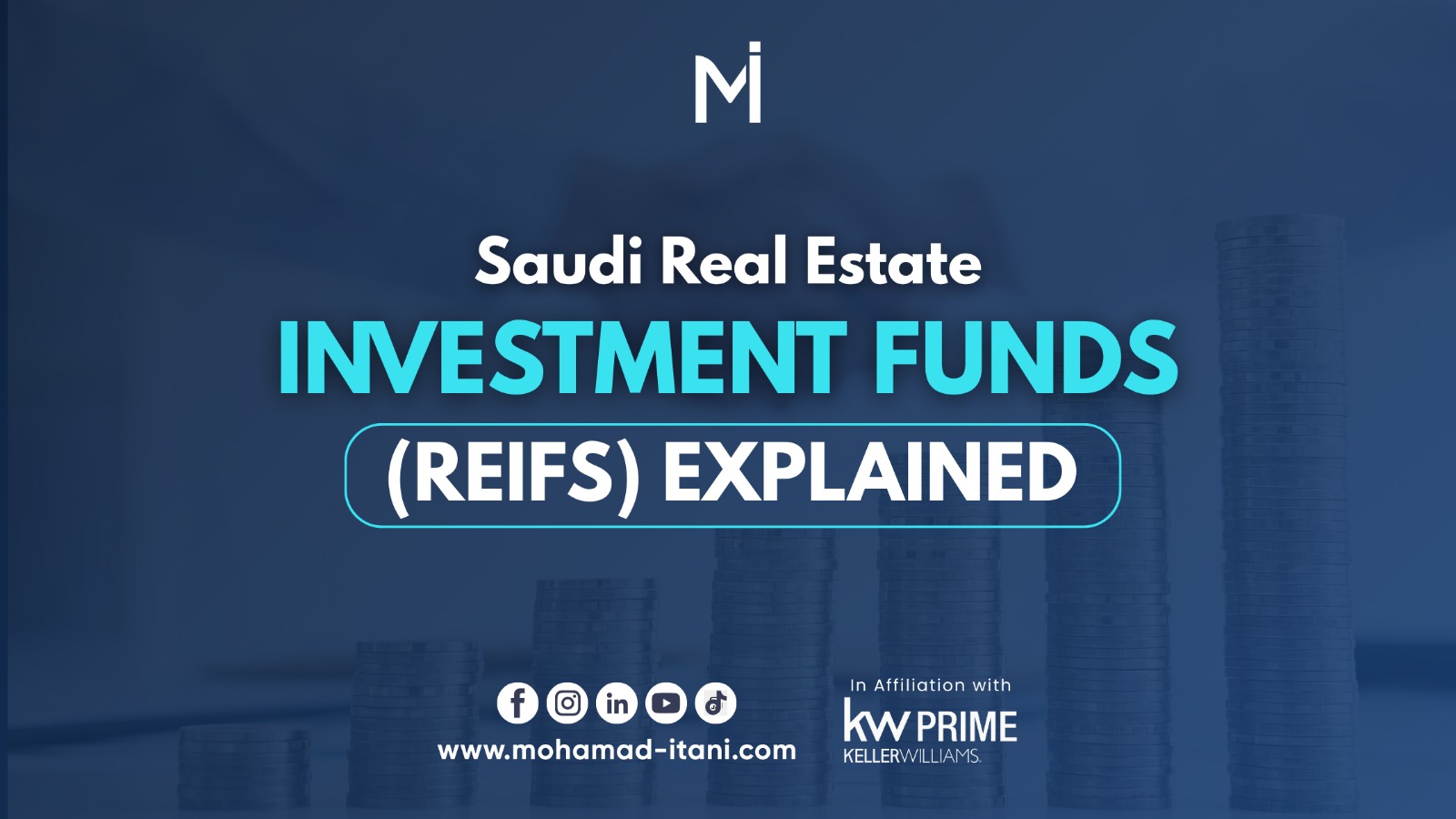Saudi Real Estate Investment Funds (REIFs) Explained
Saudi Arabia’s real estate market has become one of the most attractive investment sectors in the Middle East, thanks to the country’s economic diversification efforts under Vision 2030. One of the most promising ways to invest in real estate in Saudi Arabia is through Real Estate Investment Funds (REIFs). In this guide, we’ll explain what REIFs are, how they work, and why they are an appealing option for investors looking to tap into the Saudi property market.
What Are Real Estate Investment Funds (REIFs) in Saudi Arabia?
Understanding REIFs
A Real Estate Investment Fund (REIF) is a type of mutual fund or investment trust that pools capital from multiple investors to invest in real estate. These funds allow individuals to invest in large-scale, income-producing properties without having to buy or manage real estate directly. REIFs are listed on the Saudi stock exchange and offer investors exposure to commercial, residential, and mixed-use properties.
How REIFs Work in Saudi Arabia
In Saudi Arabia, REIFs function by raising funds from investors and using the capital to acquire, develop, or manage real estate projects. These funds typically generate income through rental yields, property appreciation, and dividends distributed to investors. The primary goal of REIFs is to provide a consistent income stream to investors while benefiting from the capital appreciation of the underlying real estate assets.
- Pooled Investment: Investors’ funds are combined to purchase real estate properties such as office buildings, shopping centers, or residential complexes.
- Dividends and Returns: Investors typically earn dividends from the rental income generated by the properties, as well as profits from property sales or capital gains.
- Diversification: REIFs provide a diversified investment across multiple real estate assets, spreading risk for investors.
Why Invest in Saudi Real Estate Investment Funds (REIFs)?
1. Access to the Saudi Property Market
One of the primary advantages of REIFs is that they offer investors easy access to Saudi Arabia’s booming real estate sector without the complexity of directly buying or managing properties. For foreign investors, this is a particularly attractive option, as REIFs allow them to invest in the Saudi real estate market while benefiting from the legal structure that facilitates foreign ownership in REIFs.
- Property Funds KSA allow both local and international investors to gain exposure to high-quality real estate developments, including those tied to major Vision 2030 projects.
2. Steady Income Stream
REIFs often provide a stable income through the rental yields generated by the properties in the fund’s portfolio. This makes them particularly appealing to income-seeking investors who want regular dividends while benefiting from the long-term capital appreciation of the real estate assets. The steady cash flow is often more attractive than other forms of investment, such as stocks or bonds, where income can be unpredictable.
- Real Estate Mutual Funds KSA are known for their ability to deliver consistent returns, particularly in the commercial and residential rental markets.
3. Lower Risk Through Diversification
Unlike purchasing a single property, investing in a REIF provides investors with access to a diversified portfolio of real estate assets. This diversification helps spread the investment risk, as the performance of the fund is not tied to a single property. For example, a REIF might include both office buildings in Riyadh and shopping malls in Jeddah, which may perform differently in varying economic conditions.
4. Liquidity and Accessibility
REIFs are listed on the Saudi stock exchange (Tadawul), making them relatively liquid compared to direct real estate investments. Investors can buy and sell shares in a REIF just like other publicly traded stocks. This provides investors with liquidity the ability to easily buy or sell their shares—while still benefiting from exposure to the real estate market.
- Unlike direct property investments, REIFs provide the flexibility of trading on the stock market.
REIFs vs. Direct Real Estate Investment
Benefits of REIFs Over Direct Property Investment
Investing directly in Saudi property can be cumbersome, especially for foreign investors. You need significant capital for down payments, the risk of property management, and ongoing maintenance costs. On the other hand, REIFs offer:
- Lower Capital Requirements: Investors can gain exposure to high-quality real estate assets with a lower initial investment.
- No Property Management Hassles: With REIFs, investors don’t have to deal with the hassle of managing properties, as the fund’s management team handles it for them.
- Diversification: REIFs invest in multiple properties, providing instant diversification in your real estate holdings.
Property Investment Funds: An Attractive Alternative
Property investment funds like REIFs allow investors to benefit from capital appreciation without worrying about the challenges of owning and maintaining a physical property. They also allow investors to access prime real estate locations that may otherwise be too expensive or out of reach.
Top REIFs in Saudi Arabia: Investment Trusts and Property Funds
1. The Public Investment Fund (PIF) Real Estate Fund
The Public Investment Fund (PIF) is one of Saudi Arabia’s most significant state-owned investment funds. The PIF Real Estate Fund invests in prime real estate assets across the Kingdom and has contributed significantly to the development of projects tied to Vision 2030.
- Focus: High-end residential and commercial properties in major cities like Riyadh, Jeddah, and Dammam.
- Yield: Typically offers competitive returns driven by property price appreciation and rental income.
2. Al Habib Real Estate Investment Fund
Al Habib Real Estate Investment Fund is another popular REIF in Saudi Arabia. It focuses on mixed-use developments, which provide both residential and commercial investment opportunities.
- Diversification: The fund offers exposure to different property types, such as office buildings, retail spaces, and residential units.
- Returns: Known for delivering stable returns through long-term property investments.
3. Taiba REIF
Taiba REIF is a smaller but notable player in the Saudi real estate market. It focuses on residential properties in emerging and high-growth areas, such as Northern Riyadh and Jeddah’s coastline.
- Growth Potential: Investors in Taiba REIF stand to benefit from the rapid development of Saudi cities and growing demand for high-quality residential properties.
How to Invest in REIFs in Saudi Arabia
Steps to Invest in REIFs
Investing in REIFs is relatively simple. Here’s a quick overview:
- Choose a REIF: Research the various real estate investment funds available on the Saudi stock exchange (Tadawul).
- Open a Trading Account: You’ll need to open a trading account with a licensed broker or bank in Saudi Arabia.
- Fund Your Account: Transfer funds to your trading account to purchase shares in the REIF.
- Monitor Your Investment: Track the performance of your REIF investment regularly through the exchange or your brokerage platform.
Frequently Asked Questions (FAQs)
Q1. What are Saudi Real Estate Investment Funds (REIFs)?
REIFs are funds that pool capital from investors to invest in real estate assets, offering income through rental yields and capital appreciation.
Q2. How do REIFs work in Saudi Arabia?
REIFs pool capital to invest in commercial and residential properties. They provide investors with dividends from rental income and profits from property sales.
Q3. What is the advantage of investing in REIFs over direct property ownership?
REIFs allow for lower investment thresholds, diversification, and liquidity, without the headaches of property management.
Q4. Can foreigners invest in REIFs in Saudi Arabia?
Yes, foreign investors can invest in REIFs listed on the Saudi stock exchange, providing access to the Saudi real estate market.
Q5. What are the risks associated with REIFs?
Like any investment, REIFs come with market risk, including the potential for lower-than-expected returns, especially if the real estate market performs poorly.













